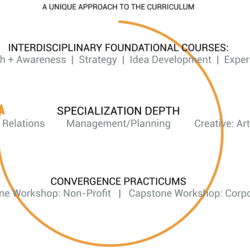Unique Features

A ONE-OF-A-KIND APPROACH TO SCHOLARSHIP AND PRACTICE or as we like to say...
One Foot in the safe space and rigor of Academia and Two Feet in the real world of communications industry.
CROSS-DISCIPLINARY COURSEWORK:
The Master of Professional Studies in Branding and Integrated Communications (BIC) is a 36-credit program. Graduate students are required to take four foundational courses to anchor themselves in the core principles of branding and integrated communication (12 credits). To deepen their expertise in a single area, students are required to take three additional courses in one of four specialization tracks: Management/Planning, Concepting/Copywriting/Art Direction, Public Relations, or Media (9 credits). Students can also select from a number of electives that will be offered at various times throughout the four-semester sequence or from the other specialization tracks (9 credits). Students can deepen their specialization knowledge from existing graduate level courses in fine arts, humanities, engineering, and the social sciences at CCNY or at other marketing programs within CUNY, such as the one at Baruch. The program culminates in two required Capstone Practicums that are modeled on an agency experience and designed to replicate the branding and integrated communication process (6 credits).
PORTFOLIO DEVELOPMENT:
Because of the growing importance of presentation and visualization in the communications field, all students will pitch themselves and their work through a website/portfolio, which is presented after completing their required capstone coursework.
BIC offers 3-credit electives for portfolio development: B2055 Creative Portfolio Thesis, B2056 Management/Strategy Portfolio Thesis, B2057 PR Portfolio Thesis, and B2028 Media Portfolio Thesis.
STUDENT DRIVEN LEARNING:
Independent, facilitated lab sessions throughout the semester will give students access to tutorials allow students to go deep into their own areas of interest while providing "over-the-shoulder" assistance by experts in design, technology, writing, presentation, etc.
CORPORATE PARTNERSHIPS:
All students will be involved in at least one workshop practicum that is sponsored by a corporation that funds a real life project, giving students hands-on industry experience.
MENTORING:
Proximity to midtown Manhattan and many major communications corporations allows for students to connect to industry professionals. Course projects and a yearly mentorship program encourage such relationships.
CRITIQUE AND PRESENTATION:
In addition to having major critique and presentation components incorporated into nearly every course, students will have their portfolio critiqued on a regular basis by professors, industry experts, peers and outside observers. Students learn how to provide meaningful critique to others in the creative space and how to receive critique and use it to fuel their ideas. We study a variety of methods but the primary method follows Liz Lerman's Critical Response Process. Although we like to think of it as FEEDING THE IDEA FORWAR.
EXPERIENCE IN THE NOT-FOR-PROFIT SECTOR:
Before graduating, students must dedicate a semester to working on an integrated communications advocacy campaign for a non-profit organization.
PROFESSIONAL ACCELERATION:
@BIC Seminars on the finer points of professional development and thought leadership will be held on campus in the BIC space throughout the year. Topics will include digital technology, project & digital management, trend forecasting, corporate social responsibility, and dynamic content. In addition, all students must attend at least one NYC-based communications conference each year and demonstrate acquired knowledge by posting to the BIC blog.
COMPETITIONS:
Students are encouraged to work in collaborative teams and enter the many competitive contests available only to students. BIC faculty mentor students to repackage existing work for new audiences, build campaigns for new briefs, and transform classwork into competition level projects. The result is that BICsters have won numerous awards and recognition at The ONE Club for Creativity’s Young Ones, D&AD, Where Are All the Black People Pitches, the Zahn Innovation Center, CCNY Graduate Symposium, ARF ReThink, Jay Chiat Awards, Effies etc.
One Foot in the safe space and rigor of Academia and Two Feet in the real world of communications industry.
CROSS-DISCIPLINARY COURSEWORK:
The Master of Professional Studies in Branding and Integrated Communications (BIC) is a 36-credit program. Graduate students are required to take four foundational courses to anchor themselves in the core principles of branding and integrated communication (12 credits). To deepen their expertise in a single area, students are required to take three additional courses in one of four specialization tracks: Management/Planning, Concepting/Copywriting/Art Direction, Public Relations, or Media (9 credits). Students can also select from a number of electives that will be offered at various times throughout the four-semester sequence or from the other specialization tracks (9 credits). Students can deepen their specialization knowledge from existing graduate level courses in fine arts, humanities, engineering, and the social sciences at CCNY or at other marketing programs within CUNY, such as the one at Baruch. The program culminates in two required Capstone Practicums that are modeled on an agency experience and designed to replicate the branding and integrated communication process (6 credits).
PORTFOLIO DEVELOPMENT:
Because of the growing importance of presentation and visualization in the communications field, all students will pitch themselves and their work through a website/portfolio, which is presented after completing their required capstone coursework.
BIC offers 3-credit electives for portfolio development: B2055 Creative Portfolio Thesis, B2056 Management/Strategy Portfolio Thesis, B2057 PR Portfolio Thesis, and B2028 Media Portfolio Thesis.
STUDENT DRIVEN LEARNING:
Independent, facilitated lab sessions throughout the semester will give students access to tutorials allow students to go deep into their own areas of interest while providing "over-the-shoulder" assistance by experts in design, technology, writing, presentation, etc.
CORPORATE PARTNERSHIPS:
All students will be involved in at least one workshop practicum that is sponsored by a corporation that funds a real life project, giving students hands-on industry experience.
MENTORING:
Proximity to midtown Manhattan and many major communications corporations allows for students to connect to industry professionals. Course projects and a yearly mentorship program encourage such relationships.
CRITIQUE AND PRESENTATION:
In addition to having major critique and presentation components incorporated into nearly every course, students will have their portfolio critiqued on a regular basis by professors, industry experts, peers and outside observers. Students learn how to provide meaningful critique to others in the creative space and how to receive critique and use it to fuel their ideas. We study a variety of methods but the primary method follows Liz Lerman's Critical Response Process. Although we like to think of it as FEEDING THE IDEA FORWAR.
EXPERIENCE IN THE NOT-FOR-PROFIT SECTOR:
Before graduating, students must dedicate a semester to working on an integrated communications advocacy campaign for a non-profit organization.
PROFESSIONAL ACCELERATION:
@BIC Seminars on the finer points of professional development and thought leadership will be held on campus in the BIC space throughout the year. Topics will include digital technology, project & digital management, trend forecasting, corporate social responsibility, and dynamic content. In addition, all students must attend at least one NYC-based communications conference each year and demonstrate acquired knowledge by posting to the BIC blog.
COMPETITIONS:
Students are encouraged to work in collaborative teams and enter the many competitive contests available only to students. BIC faculty mentor students to repackage existing work for new audiences, build campaigns for new briefs, and transform classwork into competition level projects. The result is that BICsters have won numerous awards and recognition at The ONE Club for Creativity’s Young Ones, D&AD, Where Are All the Black People Pitches, the Zahn Innovation Center, CCNY Graduate Symposium, ARF ReThink, Jay Chiat Awards, Effies etc.



